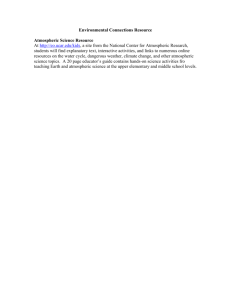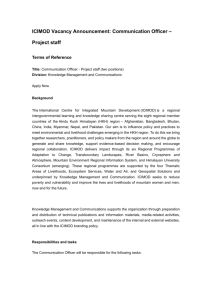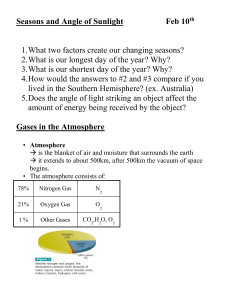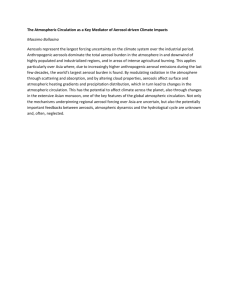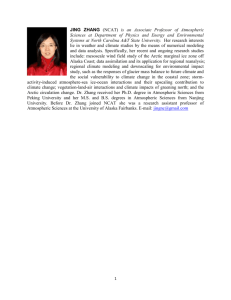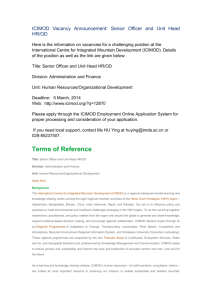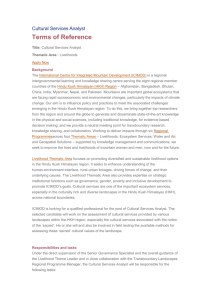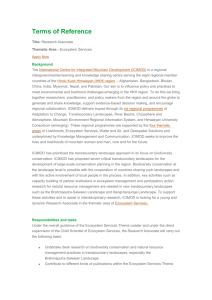ICIMOD vacancy-Atmospheric Modeller
advertisement
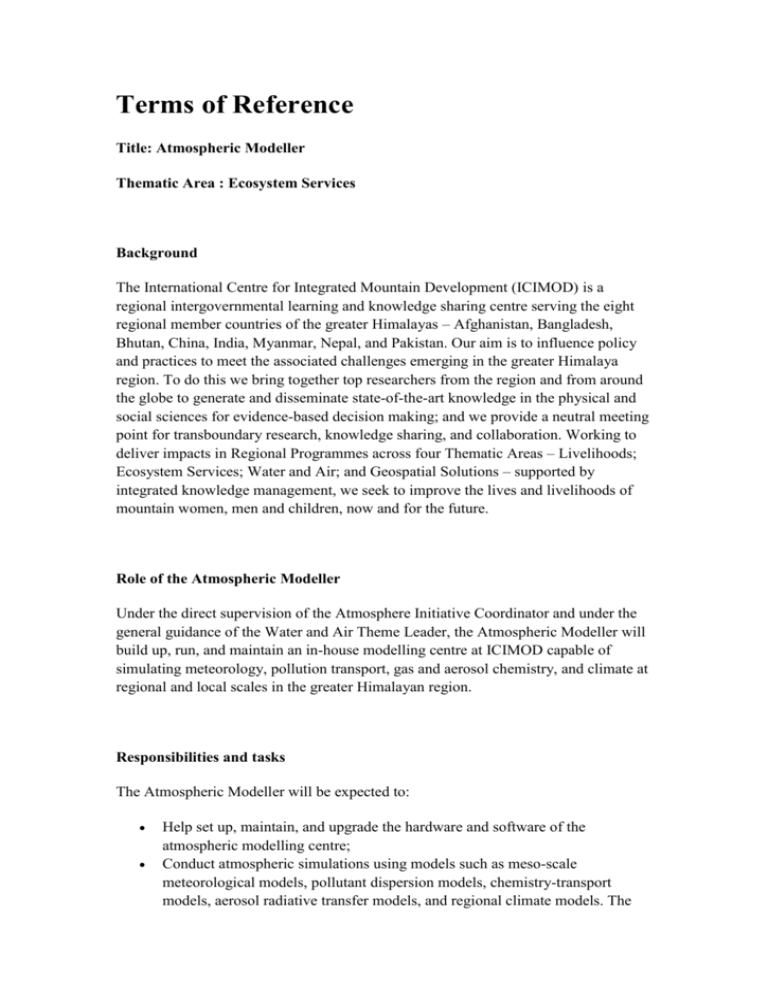
Terms of Reference Title: Atmospheric Modeller Thematic Area : Ecosystem Services Background The International Centre for Integrated Mountain Development (ICIMOD) is a regional intergovernmental learning and knowledge sharing centre serving the eight regional member countries of the greater Himalayas – Afghanistan, Bangladesh, Bhutan, China, India, Myanmar, Nepal, and Pakistan. Our aim is to influence policy and practices to meet the associated challenges emerging in the greater Himalaya region. To do this we bring together top researchers from the region and from around the globe to generate and disseminate state-of-the-art knowledge in the physical and social sciences for evidence-based decision making; and we provide a neutral meeting point for transboundary research, knowledge sharing, and collaboration. Working to deliver impacts in Regional Programmes across four Thematic Areas – Livelihoods; Ecosystem Services; Water and Air; and Geospatial Solutions – supported by integrated knowledge management, we seek to improve the lives and livelihoods of mountain women, men and children, now and for the future. Role of the Atmospheric Modeller Under the direct supervision of the Atmosphere Initiative Coordinator and under the general guidance of the Water and Air Theme Leader, the Atmospheric Modeller will build up, run, and maintain an in-house modelling centre at ICIMOD capable of simulating meteorology, pollution transport, gas and aerosol chemistry, and climate at regional and local scales in the greater Himalayan region. Responsibilities and tasks The Atmospheric Modeller will be expected to: Help set up, maintain, and upgrade the hardware and software of the atmospheric modelling centre; Conduct atmospheric simulations using models such as meso-scale meteorological models, pollutant dispersion models, chemistry-transport models, aerosol radiative transfer models, and regional climate models. The model runs will include both simulations of past episodes and forecasts of future scenarios, and will be defined as per the needs of the Atmosphere Initiative and other Regional Programmes; Conduct model validation using appropriate plotting software to visualize model outputs and make comparisons to field observations; Represent ICIMOD as a member of the global modelling community, and participate in research aimed at improving atmospheric simulations over complex terrain; Develop partnerships and collaborations with other modelling centres and modellers, both within and beyond the ICIMOD member countries; Participate in the writing of assessment reports, project reporting, proposal writing, and other documents; Publish peer-reviewed publications together with colleagues at ICIMOD and elsewhere; Mentor junior staff, affiliated students, and interns; Participate in capacity building and outreach activities in ICIMOD member countries; Use models to help identify gaps in the observation networks; Develop an expansion plan for the modelling centre, including people, hardware, software and models, and topics to address; Participate in efforts to improve emissions inventories; Manage the archiving of model outputs, including the timely expansion of storage space; Be an active member of the Atmosphere Initiative and the Regional Programme on Cryosphere and Atmosphere, and participate in team efforts beyond modelling; Work with other Regional Programmes to identify atmospheric modelling needs, provide relevant model outputs, and create synergy between initiatives; Work as a team player within ICIMOD to support other activities and promote institutional goals; and Perform other duties as requested. Minimum Qualifications Postgraduate degree, preferably PhD, in a relevant field of study (e.g., atmospheric physics or chemistry, meteorology, environmental engineering) Demonstrated experience using at least one meso-scale meteorological model (e.g., WRF, MM5 or RAMS), and at least one chemistry-transport model (e.g., WRF-Chem, CAMx, CMAQ), preferably in regions of complex terrain Demonstrated understanding of atmospheric chemistry (gas and aerosol), atmospheric dynamics, atmospheric microphysics, and climate science Experience installing, compiling, testing, and customizing atmospheric models on new computer systems and the ability to work with large observation data sets Experience working in Unix/Linux environments and using IDL, Matlab, or other software to visualize model output as well as the ability to write or modify model code written in Fortran, C, or other languages. Competencies Communication and outreach: Excellent English written and oral communication skills and the ability to effectively present, explain, and discuss complex ideas; to convince others; to listen to others; and be able to integrate ideas from different people and sources. Networking/stakeholder management: Ability to identify relevant stakeholders, maintain existing linkages, and effectively communicate with stakeholders on different levels Research skills: Knowledge and experience about relevant research methodology and analysis to create credible scientific evidence. Impact and results orientation: Ability to work independently, while drawing on long-distance support from the global community, with a strong sense of initiative, discipline, and self-motivation. Flexibility/innovation: Continuous learning attitude, ability to proactively adapt to and stay abreast with changing contexts, technologies and approaches; ability to come up with innovations and make improvements in own work area. Social/team competency: Ability to work effectively and smoothly across teams taking into account intercultural sensitivities; ability to manage minor conflicts and to contribute to establishing commitment among work group members. Report and proposal writing: Ability to independently write high quality project reports for different target groups and to contribute to successful proposal development/writing. Duty Station The duty station is Kathmandu, Nepal; occasional travel in the region and to international conferences will be required. Duration Three years, with the first six months on probation, and with a possibility of extension beyond three years subject to ICIMOD’s future funding levels. Starting Date Preferably starting as soon as possible. Remuneration Salaries and benefits of ICIMOD are competitive with other regional organizations; remuneration is commensurate with experience and qualifications. Gender and Equity Policy Qualified and eligible women candidates and those from disadvantaged backgrounds are highly encouraged to apply. ICIMOD implements a gender fair policy and is supportive of working women. It operates a Day-Care Centre at the campus and is committed to gender mainstreaming at the organisational and programmatic levels. Method of application Applicants are requested to apply online before 30 December 2012 through ICIMOD's online application system. Only shortlisted candidates will be notified.
